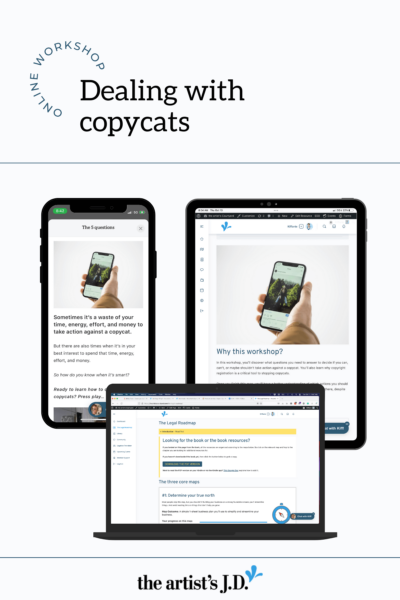I can’t emphasize enough how important copyright registrations are when it comes to stopping copycats. Yeah, yeah you have a copyright from the moment you create your work. But bluntly, that fact means nothing when it comes to enforcing your copyright.
When you try to enforce an unregistered copyright, you are walking into a fight with a fly swatter rather than a baseball bat.
Why copyright registration is important
There are two reasons that copyright registration transforms your fly swatter into a baseball bat.
2 big copyright registration benefits
First, the U.S. copyright system is designed to encourage you to complete the registration process. They do this by giving you added benefits for registering in two magic windows, namely statutory damages and attorneys’ fees.
The second is the real kicker, in the U.S. there is no way to file a copyright infringement lawsuit without a copyright registration.

So when you attach a copyright registration certificate to your cease and desist letter and the other party tells their attorney, you are much more likely to get a phone call.
This is because the other party’s attorney knows that with a registration their client is on the hook for a higher amount. They also know that there is an actual possibility of you suing.
When you can’t attach a copyright registration certificate, you could easily get ignored.
Because they know that all you can win in court is the amount you can prove that you lost as a result of the theft of your work (your usual licensing fee) and any profits they made that can be directly tied to you.
And if this amount is not more than the six-figure amount that it will cost to go to trial (or even the amount it will cost you to get your attorney to settle the matter out of court), they know that this letter will probably be the last they hear from you because after this you’ll just be throwing money away.
A copyright registration certificate turns your cease and desist letter from a mere annoyance to a real possibility of costing them money. And we all know that the potential to cost people a lot of money is what gets them to talk.
A copyright registration certificate turns your cease and desist letter from a mere annoyance to a real possibility of costing them money.
What’s the smartest action to take when a copycat strikes?

Learn to confidently assess when going after your copycat is worth the mental, emotional, and financial investment…and which action gives you the best chance of success!
Get access to a workshop, template, and resource bundle designed to help you start taking the smartest action today.
But it’s expensive to register Kiffanie!
I often hear that it’s overwhelming to consider registering your copyrights.
Because…
- you are constantly creating new work
- you’ve got years of older work that isn’t registered
And at $45 bucks a pop that adds up quickly.
So how can you register your new and older work without breaking the bank?
You can take advantage of the option to register several works on one application for $85.
Of course, the U.S. Copyright Office doesn’t let you group anything together.
It can be overwhelming to register your copyrights

Learn to confidently register your copyrights with the U.S. Copyright Office…even if you have tried (and given up) before!
Get access to an in-depth course guiding you step-by-step and screen-by-screen through the process of registering your copyright with the U.S. Copyright Office. You’ll go from not knowing what you are going to register to having a strategy for future registrations.
And if you get stuck, you’ll have our 24/7 online community to help you out!
Registration Rules
The U.S. Copyright Office has several rules on what you can group together on the same electronic copyright registration application (called eCo).
To decide what you can group together on an eCo form (and save yourself some money), you need to answer four questions:
- Who created the work (called the “authors”)?
- Who owns the copyright in the work (called the “claimants”)?
- Has the work been published?
- Were the works bundled together as a unit?
Collection of unpublished works
If you answered that there is a common author in all of the works in the group, that the same person or organization is the copyright owner for all of the works in the group, and the group of works is all unpublished; then you have a group of unpublished works. This allows you to group up to 10 creations that meet these criteria on the same application.
Group of published works
If you answered that the same person or organization is the copyright owner for all of the works in the group, that the works are published, and the works were first published on the same day as a bundled unit, then you have a group of published works. This allows you to group all the works in that unit on the same application.
Group of published photographs
If you are attempting to register published photographs, you have another option!
If you answered that there is a common author in all of the photographs in the group, that the same person or organization is the copyright owner for all of the photographs in the group, and the group of photographs was all published in the same calendar year; then you can take advantage of a group photograph application. This allows you to group up to 750 photographs that meet these criteria on the same application.
Everything else
If your grouping doesn’t meet the above criteria, then you’ll either need to: (1) decrease the size of the grouping until it meets the criteria; (2) register the work on its own eCo form; or (3) determine if you can use a paper form to group the works together. The paper application costs a bit more than the eCo form but if you can group three or more works on the paper form, it’s cheaper than registering them alone on the eCo form.
Playing catch up
If you are like most creative businesses, you’ve got loads of unregistered copyrights.
So how do you get caught up without breaking the bank?
First up, create a batch of unpublished works and get them registered. Bam! 85 bucks later you’ve got 10 works registered and protected.
Next, I’m going to have you put on your tough love hat because we need to be practical. I’m not going to be that crazy-pants lady that tells you to register every…single…old…creation. That’s totally unrealistic.
I’m not going to be that crazy-pants lady that tells you to register every…single…old…creation.
What I think you should do is look through everything else and figure out which of the remaining unregistered creations make you the biggest income.
Don’t let your heartstrings pull you to register your favorites, but those that are putting dollars in your bank account each month. Then put those in order of priority from most to least income.
Now, take your biggest moneymaker and decide using the criteria above or the criteria for a paper application what else you can group with that creation. Don’t limit yourself to those on your hit list, but pull from your entire catalog of work.
Repeat this process each time cash flow allows it, working your way down the list (and reorganizing and adding to your list as appropriate).
Saving you moola from here on out
Register them when they are unpublished
For most creative businesses, you are the sole author and copyright owner of the work. So the most cost-effective way to register works is to do so before they are published since that will give you the most flexibility in what you can group on the same application.
This requires that you build the copyright registration process into your workflow, before you publish your work.
Publish as a bundled unit
The second way to save you money is to think about publishing things as a bundle.
For example, you could publish a bundle of new digital downloads for Valentine’s Day. The bundle might contain printable cards, gift tags, wall hangings, and banners. To meet the Copyright Office requirements, you would first have to publish them as a bundle that someone could purchase as a unit. But they don’t require you to keep them solely as a bundle forever, so several weeks later you could offer in addition to the bundle each of the items separately.
Cost of doing business
Last up, I want you to consider registration as a cost of doing business.
Often registration feels like it’s stealing money out of your pocket because it’s not an expense that you planned for. However, if you build it into the cost of a piece (just like the supplies and equipment you need to create it), then it’s just part of your businesses’ overhead; and not coming from your take-home pay. I know that when I plan for an expense and work it into the cost of a product or service, I feel better about paying it.
Copyright registration feels like it’s stealing money out of your pocket because it’s not an expense that you planned for.
How you can easily apply this today
Figure out what works you have that are considered unpublished by the Copyright Office.
Once you’ve got that done, you can block off some time to head over to the eCo system and get them registered.
It can be overwhelming to register your copyrights

Learn to confidently register your copyrights with the U.S. Copyright Office…even if you have tried (and given up) before!
Get access to an in-depth course guiding you step-by-step and screen-by-screen through the process of registering your copyright with the U.S. Copyright Office. You’ll go from not knowing what you are going to register to having a strategy for future registrations.
And if you get stuck, you’ll have our 24/7 online community to help you out!
Do you still have questions?
No shame in that! One of the perks of membership in the artist’s Courtyard is a 24/7 private online community to ask your questions and get my answer (and insights from other creatives). Already a member? Ask your question! Not a member yet? Join us inside the artist’s Courtyard for $45/month!

Hi! I’m Kiff! I’m your friendly legal eagle (and licensed attorney).
My goal is to add ease to the legalese. And because I think basic legal resources should be available to every creative, I create a lot of free content.
If I’ve created something that has helped inject a little ease into your creative business and you would like to say “thank you”, you can make a contribution here.
If you’d like to hear more from me, I’d love to pop into your inbox every Friday morning to share additional ways to cut through the red tape and inject a little ease.
Get tips from your friendly legal eagle in your inbox…
Your privacy is important to us. Learn how we protect it here.

